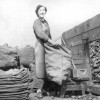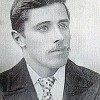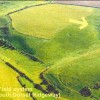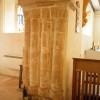Whatever happened at Max Gate now that her master was dead, Nellie knew she would not be working there for much longer; she would have been thinking about how to keep her pregnancy a private matter.
Nellie’s employment at Max Gate was full time and she lived in. Her hours of work being 7 a.m. to 10 p.m. with one half day off during the week and she had either Sunday morning or Sunday afternoon off leaving little time for romance. Besides her employer the only other male in the household was the gardener Mr. Bert Stephens: he didn’t live in. There was a procession of distinguished men who regularly visited Hardy and later in her life Nellie commented about some of them quite warmly but most likely the father of her child was a lad from Dorchester. Whoever he was Nellie kept his identity to herself.
The widowed Florence Hardy shut up Max Gate and moved to London where in the closing days of August 1928 she took a flat or suite of rooms at the Adelphi Terrace. She wrote to Nellie telling her she needed the companionship of someone she could trust– Nellie later said this was quite a change of heart for, at Max Gate, Florence trusted no one. Mrs Hardy would have been surprised and taken aback not to have received a reply to her offer of a position.
For Nellie this was a dream job, an opportunity to be reacquainted with her mistress’s celebrity friends from the literary and artistic worlds, albeit from below stairs. So what kept the maid from skipping to the post box with a letter of acceptance?
While Florence was moving into her London accommodation her maid was in Dorset County Hospital, Dorchester where, on the 28th of August 1928, she gave birth to a baby girl.
A member of the extended family has told me “…her family wouldn’t let her keep the child and it was given to….” The birth was registered on September 20th and a certificate issued by the Registrar Mr F.J.Kendall. In the margin of the certificate is a one word declaration signed by the Superintendent Registrar, Mr Henry Osmond Lock: the word is “Adopted.” The arrangements for the adoption were well advanced before the arrival of the child who filled a gap in the lives of the adopting couple and ensured the child would be out of sight if not out of mind.
Nellie’s dramatically altered circumstances meant that later when she opened her front door and saw the mistress of Max Gate on the step she could accept Florence Hardy’s repeated offer to join her in London. The move from the steady pace of life in the County town to all the excitement and hurly-burly of life in the capital was just the tonic Nellie needed and she would be free of all the knowing glances and gossiping neighbours speculating in whispers about who was the father of her child.
In case you are wondering, Nellie named her daughter Florence Maxina Eunice, which tells us something of how she felt about her time with the Hardy’s, but later in life she said her days at Max Gate were not the happiest of her life. The inclusion of Eunice in the child’s name confirms Nellie knew who was going to bring up her child. We are left to wonder if Nellie followed her daughter’s life from a distance and if she knew the girl married and had four children.
The extent of Hardy’s fortune came as a complete shock to the two women but the gaiety of London life brought about a dramatic change in Florence. She became an altogether happier, less inhibited person, able to spend her miserly husband’s legacy. During this time Florence forged a friendship with Sir James Barrie, for whom Nellie would cook simple dinners at their flat. When a later quarrel ended the friendship with the author of Peter Pan, Florence and Nellie returned to Max Gate and soon after Nellie left Max Gate for good.
In the spring of 1941 Nellie’s mother passed away. Later in her life Nellie recalls that Hardy would often ask her to post letters for him at the General Post Office in South Street, Dorchester. Florence Hardy used to apologise for this cycle journey into the town, but Nellie didn’t mind because it gave her a chance to look in on her Mother for a few minutes.
In one edition of the Dorset Yearbook there is an article, which is the story in effect a biographic testimonial as related to a woman called Hilary Townsend, by Nellie towards the end of her life when in service caring for the author’s invalid mother. Despite becoming more infirm through arthritis she rarely left the old woman’s side, and still carried out all the domestic duties. One day she told her charge’s daughter: “If I stopped coming to you ma’am I shall die – I know I shall.”
Indeed, her words proved to be a self-fulfilling prophesy. One Saturday in 1977 Nellie Titterington missed her regular visit, saying that she was unwell. By Monday she was dead. The following day, the 24th of May, her younger sister Margaret Grace Hocking went to the Registrar’s office to record that Ellen Elizabeth Titterington a domestic servant of 1 Marie Road, Dorchester, had died.
So departed a highly intelligent, ever cheerful, unforgettable domestic servant who would be delighted to know that people are still talking and writing about her.
——————
[We have looked at the Hardy biographies (Seymour-Smith, Millgate & Tomalin,) the Monographs, Dr Marguerite Roberts work ‘Florence Hardy & the Max Gate Circle’ and Hilary Townsend’s article in the Dorset Year Book series as well as civil registration and census records and found nothing to suggest Florence Hardy knew about Nellie’s child.]
[We have placed a photograph of Miss Titterington in the photo section.]



